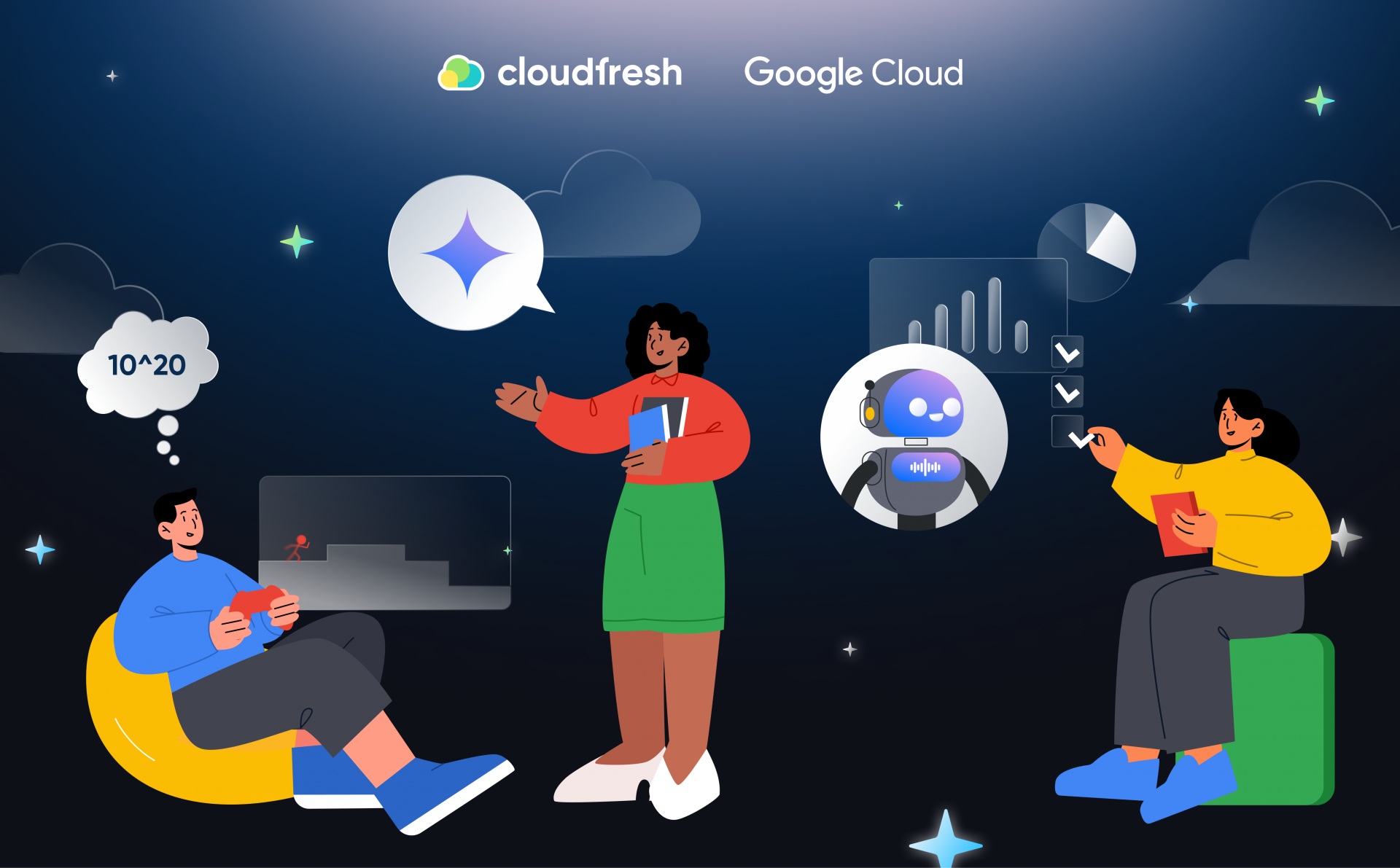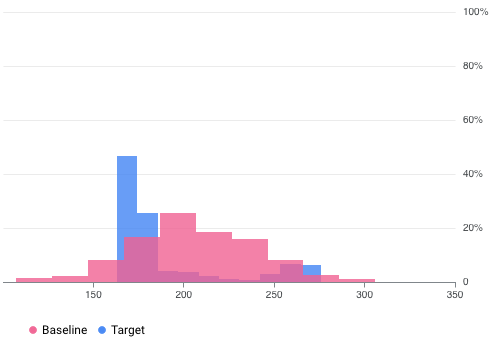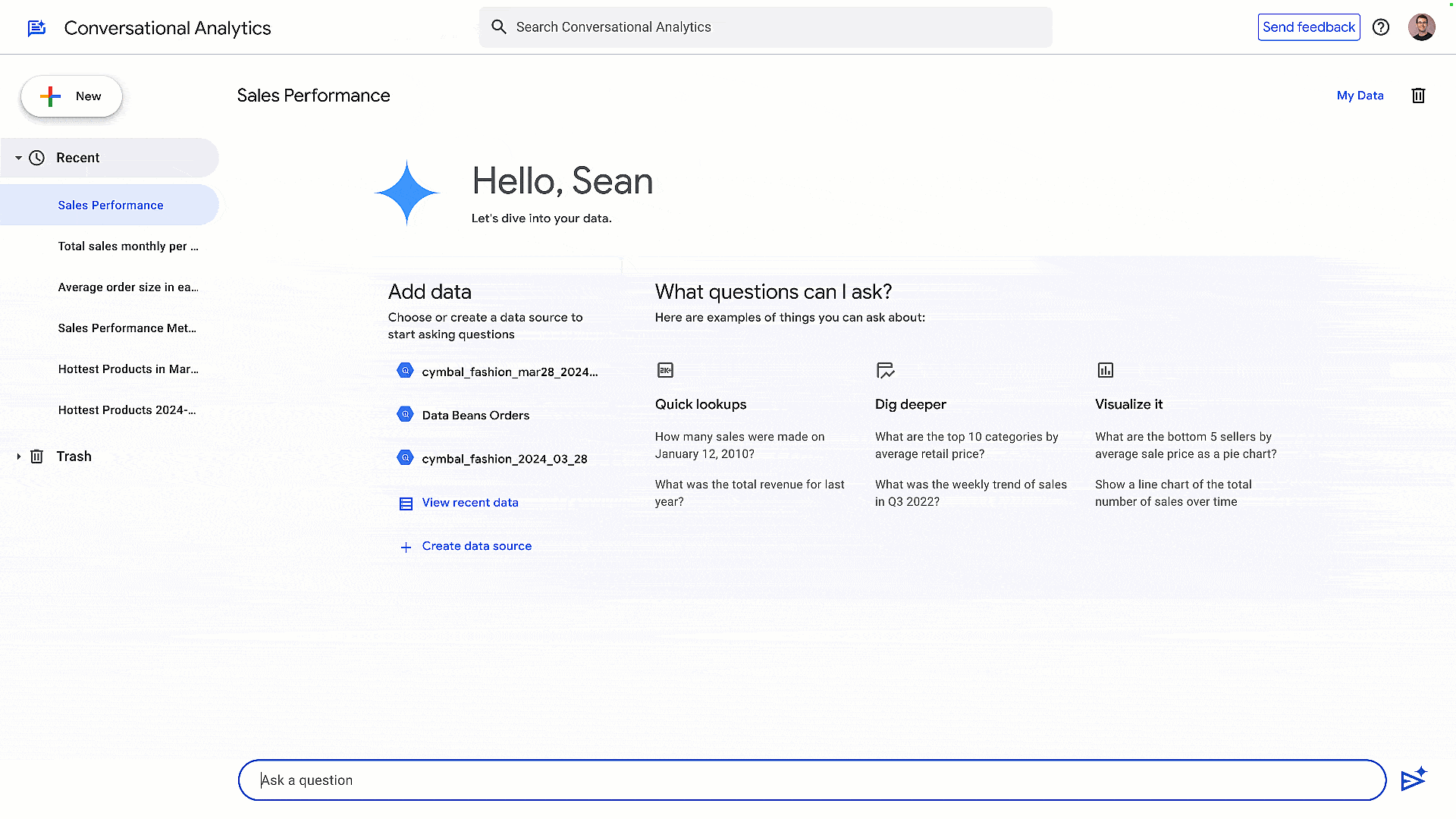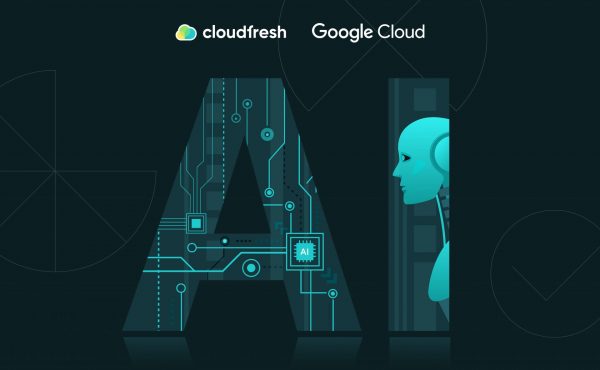AI & Machine Learning Trends to Impact Business in 2024
AI Data Analytics on Google Cloud Platform & How Much It Costs
- AI Data Analytics in Real-World Action

- Vertex AI

- Gemini: Generative AI for Data Analytics

- About Us

In today’s article, we’d like to dive into the cost structure of AI data analytics on Google Cloud Platform (GCP), one of the biggest cloud infrastructure providers by market share.
First, it’s worth noting that on all official Google Cloud resources, artificial intelligence (AI) and machine learning (ML) are inseparable and treated as a single category.
The number of related products ranges from 17 to 27, which shows that Google is actively expanding the lineup to reflect growing demand for new functionality.
Here, we’ll focus on the pricing aspects of two core GCP products, namely Vertex AI and Gemini, along with AI analytics tools such as BigQuery and Looker.
As a Premier-tier global Google Cloud Partner, we’ll do our best to answer these questions:
- Is storing training data for neural architecture search in BigQuery as costly as running Vertex AI NAS itself?
- What does it cost to use BigQuery as an offline feature repository for machine learning (Vertex AI Feature Store)?
- How much does peace of mind cost? Monitoring Vertex AI models with training and prediction data stored in BigQuery.
- Is a Gemini Code Assist subscription worth it? A look at conversational analytics in Looker and cost optimization in BigQuery.
Let’s get started!
AI Data Analytics in Real-World Action
Each of the use cases below highlights how organizations in very different industries use Google Cloud AI tools to solve big challenges, improve efficiency, and create new opportunities.
Transportation & Mobility
- Geotab uses BigQuery and Vertex AI to process billions of data points every day from more than 4.6 million vehicles. The results fuel smarter fleet management, safer driving, transportation decarbonization, and insights that help cities become safer and more sustainable.
Finance & Insurance
- Dojo supports millions of secure, lightning-fast payments daily. With Looker and Gemini models, the company is testing new ways for businesses to interact naturally with payment information.
- United Wholesale Mortgage is reshaping the mortgage process with Vertex AI, Gemini, and BigQuery. In only nine months, it doubled underwriter productivity, cutting loan closing times for 50,000 brokers and their clients.
- Hiscox built the first AI-powered lead underwriting model for insurers using BigQuery and Vertex AI. Complex risk quotes that once took three days now take only minutes.
- MSCI, a leading publisher of market indexes and indicators, uses Vertex AI, BigQuery, and Cloud Run to enrich information on nearly one million asset locations. These insights, backed by AI data analytics, help clients measure and manage climate-related risks.
- Apex Fintech Solutions relies on BigQuery, Looker, and Google Kubernetes Engine to expand access to financial insights, simplify investing, and prepare for AI-driven innovation.
- 180 Seguros improved its internal data platform with Google Cloud AI and BigQuery. Employees now track operational metrics with queries running three times faster.
- Aluga Mais, a rental startup in Brazil, uses Vertex AI, Document AI, and BigQuery to build financial profiles of customers. It sped up registration analysis from 90 minutes to just 24 seconds.
Retail & Consumer Goods
- Tchibo, the European coffee and e-commerce brand, depends on Vertex AI and BigQuery for demand forecasting. Its AI-powered data analytics solution, DEMON, makes more than six million predictions a day, helping the company manage inventory, lower logistics costs, and improve product availability.
- Unilever digitized its trade distribution with BigQuery. The company now processes 75,000 orders a day and serves millions of retailers in emerging markets.
- Gymshark, a U.K. fitness brand and community, built a unified data platform with BigQuery, Looker, Dataflow, and Vertex AI. This system delivers deeper customer insights and personalized fitness experiences at scale.
Healthcare
- ARC Innovation at Sheba Medical Center uses Looker Studio and BigQuery ML to create AI data analytics solutions that improve critical clinical decisions in ovarian cancer treatment.
Technology & Services
- Bosch SDS put sustainability at the core of its operations with Google Cloud. Using Kubernetes, BigQuery, and Firebase, the company built an AI-driven cognition engine that issues real-time alerts. The results include a 12% cut in energy costs, improved indoor comfort, and greater use of renewable energy.
Media & Entertainment
- Spotify partnered with Google Cloud to handle massive scale with BigQuery. The platform processes huge volumes of information to deliver personalized listening experiences to more than 675 million users worldwide.
Explore more GCP case studies.
Vertex AI
When it comes to building and managing machine learning models on Google Cloud, Vertex AI offers a toolkit that covers the full spectrum—from discovering the best neural architectures to organizing features and monitoring model performance.
Whether you’re experimenting with Neural Architecture Search (NAS), centralizing your feature data with a Feature Store, or keeping an eye on model quality with Model Monitoring, these tools let you design, train, and maintain AI data analytics systems efficiently.
Let’s take a closer look at how each component works, how much Vertex AI costs, and how it fits into a real-world ML workflow.
Neural Architecture Search (NAS)
Vertex AI Neural Architecture Search (NAS) is a tool for finding the most accurate neural architectures. It lets you account for or ignore constraints like latency, memory size, and custom metrics.
With the ability to explore a search space as large as 10^20, NAS has helped create advanced computer vision models such as Nasnet, MNasnet, EfficientNet, NAS-FPN, and SpineNet.
But NAS isn’t plug-and-play. It requires a dedicated team to configure and test architectural parameters like kernel size or channel count. It’s best suited for cases where traditional methods, like hyperparameter tuning, no longer deliver improvements.
It isn’t recommended to use NAS if you have limited or heavily imbalanced data, since it relies on large-scale experimentation and availability.
For example, let’s run a few test jobs using a preconfigured search space and the MNasNet trainer.

On the chart, you’ll see that the best reward at stage 1 rises from about 0.30 in trial 1 to roughly 0.37 by trial 17. Your results may differ slightly due to sampling randomness, but you should still notice an upward trend.
Keep in mind, this is only a test run and not a proof of concept (PoC) or public benchmark for AI-powered data analytics.
- Trials, in total: 25
- GPUs per trial: 2
- Type of the GPU: TESLA_T4
- CPUs per trial: 1
- Type of the CPU: n1-highmem-16
- Average training time per trial: 3 hours
- Trials in parallel: 6
- Total GPU quota used: (num-gpus-per-trial × num-parallel-trials) = 2 × 6 = 12
- Region: us-central1 (training data stored in the same area; no additional quota needed)
- Runtime: (total-trials × training-time-per-trial) ÷ (num-parallel-trials) = (25 × 3) ÷ 6 = 12 hours
- Expressed in GPU hours: (total-trials × training-time-per-trial × num-gpus-per-trial) = 25 × 3 × 2 = 150 T4 hours
- Expressed in CPU hours: (total-trials × training-time-per-trial × num-cpus-per-trial) = 25 × 3 × 1 = 75 n1-highmem-16 hours
The estimated cost stands at about US$185. Of course, you can stop earlier to cut expenses.
The flexibility of NAS makes it powerful, but also expensive. It’s best for enterprises that are ready to invest in innovative modeling projects at scale.
Besides virtual machines, accelerators, and disks (depending on type and region), you’ll also need Cloud Storage.
Most important here is the cost of training storage, where BigQuery can also be used with its own pricing model. For example, your first 10 GiB per month are free for AI data analytics and other purposes.
Vertex AI & BigQuery Integration: Feature Store
Vertex AI Feature Store is a centralized repository for managing and processing machine learning features.
Feature stores are a core part of end-to-end MLOps infrastructure on GCP. They allow Data Science and ML teams to speed up deployment cycles by organizing features across the entire organization.
With a feature store, it’s easier to create, store, share, search, and deliver features to ML applications.
In addition, BigQuery can serve as an offline feature store.
This means organizations can use their existing infrastructure, avoid duplication of AI data analytics, and cut costs.
Teams can also leverage BigQuery SQL for feature engineering with built-in access and control settings.
Because BigQuery is used for offline operations, you’ll be billed for things like loading data, running queries, and storing offline datasets.
For example, if you use the BigQuery Storage Write API in the europe-west4 region (the Netherlands), you get 2 TiB per month for free. Beyond that, it’s US$0.03 per additional GiB.
Model Monitoring
Vertex AI Model Monitoring lets you run on-demand or scheduled jobs to track the quality of tabular models.
If alerts are set up, the system will notify you whenever metrics cross predefined thresholds.
Say you’ve built a predictive AI analytics model to track Customer Lifetime Value (CLV). After launching a new loyalty program, the original features may no longer reflect customer behavior. This type of change is known as data drift.

Model Monitoring can detect and alert you when drift exceeds your thresholds. At that point, you may need to re-evaluate or retrain your AI-powered data analytics model.
Pricing stands at US$3.50 per GB of analysis, including both training and prediction data stored in BigQuery tables.
Additional charges apply for other Google Cloud products used alongside Model Monitoring, like BigQuery storage.
Example:
The Data Science team launches monitoring for a model trained on data from BigQuery. After converting the training data into a TfRecord, the size is 5.0 GB. Prediction data recorded between 10:00 and 11:00 AM totals 0.5 GB, and between 4:00 and 5:00 PM, another 0.3 GB. The total cost of setting up model monitoring is:
(5.0 × US$3.5) + ((0.5 + 0.3) × US$3.5) = US$20.3
Other Vertex AI components that work with BigQuery include Workbench, Deep Learning Containers, Deep Learning VMs, and AI Platform Pipelines. Charges apply if you run SQL queries inside a specific notebook (a code asset in BigQuery Studio).
Gemini: Generative AI for Data Analytics
When it comes to realizing the full potential of AI in data analytics, Gemini adds an intelligent layer across BigQuery and Looker.
From simplifying complex queries and exploring datasets visually to generating reports and dashboards with natural language prompts, Gemini helps teams work faster, make smarter decisions, and get more value from every workflow.
Let’s see how it improves each platform and supports real-world operations.
BigQuery
Gemini in BigQuery brings AI-powered data analytics into your warehouse. It provides smart tools for managing and optimizing workloads across the entire lifecycle.
Gemini supports analysts, engineers, data scientists, and database admins with features like Python and SQL code generation and autocomplete.
With natural language to SQL, you can quickly build queries, speed up development, and test more easily.
Gemini can also explain complex SQL queries in plain language, making them more accessible.
Search is enhanced with semantic capabilities. You can instantly find the right tables, pull relevant queries, and run them in one click.
For Google Cloud migration or transformation, Gemini helps translate queries and reduce manual AI data analytics setup.
The Data Canvas interface adds a visual way to explore. You can run prompt-based analysis (for example: “Find sales tables in Kharkiv”), then push results to production, export them for further analysis in BigQuery SQL, or share them via Looker, Looker Studio, Google Sheets, or Google Slides.
Gemini also helps with cloud cost optimization and performance at every stage of the data pipeline. These improvements carry over to downstream workflows, whether you’re building dashboards, ML models, or AI data analytics applications.
And they’re not limited to SQL or Python. Serverless data analytics pipelines on Spark benefit as well, making it easier to catch and fix errors quickly.

Looker: Conversational Analytics
Gemini in Looker makes it easy to generate reports with charts, titles, themes, and layouts, all from a simple prompt.
What you get is a base report that you can adjust further with natural language. Think of this as a built-in Looker consulting specialist!
The advanced assistant can also generate JSON code for custom visualizations, so creating and tweaking charts is faster.
Another useful feature: automatic slide generation. AI-powered data analytics reports can be exported to Google Slides with text explanations that highlight key insights.
You can even create calculated fields without memorizing complex formulas, which makes ad-hoc analysis much easier.
Pricing
The full set of Gemini in BigQuery features is available through the Gemini Code Assist Standard subscription. The price is US$22.80 per user per month, or US$19.00 per user per month with a 12-month commitment.
They’re also accessible as part of BigQuery Enterprise, Enterprise Plus, and On-Demand Compute editions. The exact price will vary based on slot-hours and location.
All of the options above are subject to specific quotas, too.
As for Gemini in Looker analytics, it currently comes free of charge, although this could change at any time.
About Us
As a Premier Partner, Cloudfresh provides top-notch Google Cloud consulting services and helps organizations make the most of AI for data analytics.
Whether it’s building smarter workflows with Gemini, training and deploying models on Vertex AI, making data actionable in BigQuery, or bringing insights to life with Looker, you get a solution to fit real business needs.
From strategy to implementation, the Cloudfresh team designs scalable, secure, and cost-effective systems, so you can move faster, arrive at better-informed decisions, and generate lasting value with Google Cloud GenAI use cases that adapt to the way you work.
To get the conversation going, feel free to fill out the short form below.












